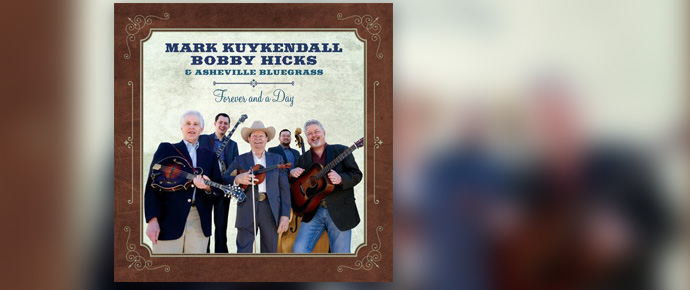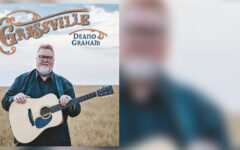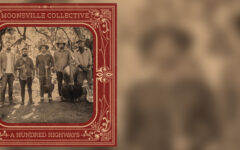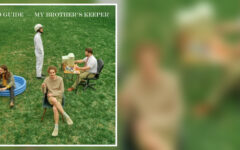
The term “traditional bluegrass” can mean many different things these days. For some groups, it means they play rough and raw and record live around one microphone; for others, it means they dress in suits and ties and try to sound as much like Monroe or the Stanleys as they can. For Mark Kuykendall, Bobby Hicks, & Asheville Bluegrass, it means a crisp, clean sound grounded in the bluegrass and country music of the ’50s and ’60s, played by several men who have firsthand experience picking with first generation musical heroes.
Their sophomore album, Forever and a Day on Rebel Records, includes such venerable names as Bill Monroe, Ernest Tubb, and Woody Guthrie in the songwriting credits, but the group has leaned toward lesser known numbers that aren’t as likely to be played in every festival campground between here and Bean Blossom. The album as a whole has a bright, cheerful feel, guided by Hicks’s versatile fiddle and excellent classic-style banjo and mandolin from Seth Rhinehart and Mike Hunter. Kukyendall on guitar and high lead vocals and bassist Nick Dauphinais round out the talented group.
The album opens with Roust-a-bout, written by Josh Graves and Jake Landers and recorded in the latter days of Flatt & Scruggs. It’s a fun, energetic song about a member of a Mississippi River steamboat crew, with both the tempo and swagger turned up a bit from the original. The musicians are tight, with the banjo, fiddle, and mandolin playing neatly off each other. Bill Monroe’s Mary Jane, Won’t You Be Mine has plenty of kick, as well. It’s a stellar example of old-school drive, with Rhinehart’s banjo chugging along and Kuykendall simply killing the vocals. Personally, I really appreciate the band’s choice to record this song instead of the more popular Say, Won’t You Be Mine version. I don’t know who Mary Jane was, but I love her.
Also enjoyable is the bouncy We Live in Two Different Worlds, with its clever chorus: “You made your world out of vows that were broken, I built a world in my heart.” A number of country musicians have recorded this song, but Asheville Bluegrass gives it a solidly bluegrass feel – a nice example of the upbeat heartbreak song. On the other hand, Leon Payne’s They’ll Never Take Her Love From Me is pure classic country. It’s a showcase for Hicks, as he’s featured on a rare lead vocal and offers up excellent, mournful country-style fiddling.
Not all of the songs on the album are older. Kuykendall penned two originals for the recording, and Hicks contributes a fiddle tune of his own. I Don’t Have the Want to Anymore tells of a man who’s tired of waiting around for a woman who’s never going to call or come around. By the lyrics alone, it should be a tired, depressing song. Instead, it’s cheery, helping push away the narrator’s loneliness. Kuykendall also wrote the title track, a pleasant love song that begs to be played at bluegrass weddings. Hicks’s Zuma Swing is, as the title suggests, a country swing number that will have listeners kicking up their heels. Hicks’s fiddling is spot-on, and Hunter’s mandolin is also of note on this tune.
Sally, Don’t You Grieve has an interesting backstory. Originally written by legendary folksinger Woody Guthrie about a soldier heading overseas during World War II, singer-songwriter Malvina Reynolds turned it into the story of a rambling man urging his woman not to miss him – perfect for the bluegrass world. Asheville Bluegrass gives it a fun rolling melody and you can hear a bit of excitement in Kuykendall’s voice as he sings “With a restless foot and a roving mind, I’m gonna leave this town behind.”
Just as the album starts out on a high note, it also ends on one with a strong version of Monroe’s Wicked Path of Sin. There are some nice trio harmonies on the chorus – both from Hicks and a bright tenor from Dauphinais, along with Kuykendall’s lead – and great tremolo from Hunter on mandolin. Though it’s another bouncy, mid-tempo number like many of the others on this album, the vocal arrangements of both it and Sally, Don’t You Grieve (which precedes it) help mix things up a bit. It’s also just a solidly good song, and a good choice for the group.
Mark Kuykendall, Bobby Hicks, & Asheville Bluegrass are the real deal. All five members have strong instrumental skills and a real grasp of the intricacies of the sound of the early years of bluegrass. They’re not a cover band, or a tribute band, by any means. They’ve got their own style, they’ve got Hicks’s truly epic fiddle playing, and they’ve got unique vocals that are at a different end of the spectrum than the country style favored by many male bluegrass vocalists today. If you like traditional bluegrass, check out Forever and a Day.







